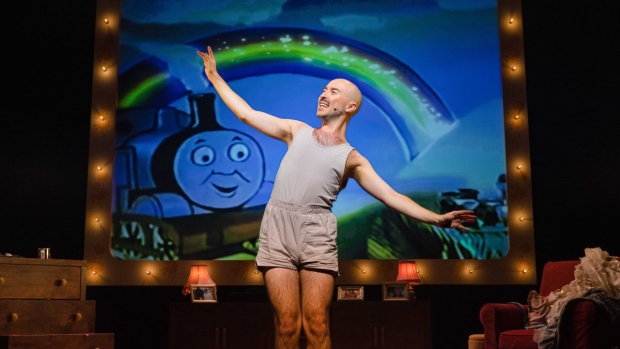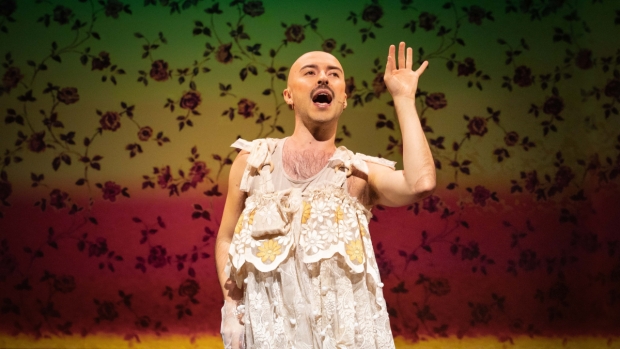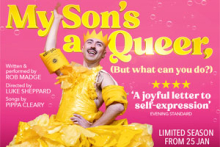”My Son’s A Queer (But What Can You Do?)” at the Ambassadors Theatre – review

© Mark Senior
The videos of Madge as a child are here in all their glory, and act as a jumping-off point for them to talk about how imaginative play, musicals and dressing up gave their family the language to understand their child’s queerness. It’s not quite a show about Madge figuring out their gender and sexuality, but rather about the people around them figuring it out, and about the ways that Madge’s parents and grandparents opened up the world for them to be themselves. This is dressed up as Madge recreating the Disneyland parade they performed as a child for their grandma, talking through the costuming and tips for anyone else who wants to do the same. In reality, it’s much more about a zig-zag through Madge’s upbringing, looking at the key moments when their self-understanding clashed with the perceptions of people around them, showing us how they became the performer and person they are today.
The show is at its best when focused on Madge’s incredible connection with the audience, whether in person or as a child in the video tapes. Director Luke Shepperd and design team Ryan Dawson Laight (set and costume), Jai Morjaria (lighting) and Tingying Dong (sound) have gorgeously recreated a version of Madge’s living room that is simultaneously simple but can leap into the high-budget showstopper of young Madge’s dreams. It’s both slick and delightful, and really does capture a Disneyland-esque feeling. In their hands, you feel as if anything really could be possible, which is boosted by Pippa Cleary’s wonderful, ear wormy songs.
Tonally, the script is nimble and jumps from joke to heartbreak in a line, which is absolutely landed by Madge’s delivery. They are perfectly cheeky and wry, and know what their audience wants, shooting off one-liners about the theatre industry with as much ease as when talking about difficult conversations and moments with their family, teachers and peers.

© Mark Senior
I was struck watching the show this time by how much the long shadow of Section 28 cast upon experiences – particularly in school – that queer children have had in this country ever since. Growing up in the noughties, even though the law preventing teachers from talking to their pupils about queer lifestyles was repealed in 2003, homophobic attitudes were still rife, and we can see it in the responses Madge’s teachers had to the creativity and imagination that their parents supported. Rather than embracing difference, it was used to shut them down and shame them.
The power of My Son’s A Queer is that it carries forth the defiance against this homophobic expectation that queer kids (and any kids who don’t fit into the mould of little boy costume or little girl costume) should hide themselves away until they fit. Madge takes the story of their parents’ understanding and acceptance, and amplifies it to a West End stage, promising the hundreds of other non-conformers that they too can be themselves and that they can expect their families to support them in doing so. In the UK (and wider)’s current atmosphere of intense transphobia, where transphobic commentators often take aim at parents who support their transgender and non-binary children, this show feels particularly necessary and incredibly powerful.

















